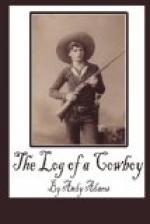“Some professor, a professor in the occult sciences I think he called himself, had written to the mayor to know what kind of a point Dodge would be for a lecture. The lecture was to be free, but he also intimated that he had a card or two on the side up his sleeve, by which he expected to graft onto some of the coin of the realm from the wayfaring man as well as the citizen. The mayor turned the letter over to Bat Masterson, the city marshal, who answered it, and invited the professor to come on, assuring him that he was deeply interested in the occult sciences, personally, and would take pleasure in securing him a hall and a date, besides announcing his coming through the papers.
“Well, he was billed to deliver his lecture last night. Those old long horns, McNulta and Lovell, got us in with the crowd, and while they didn’t know exactly what was coming, they assured us that we couldn’t afford to miss it. Well, at the appointed hour in the evening, the hall was packed, not over half being able to find seats. It is safe to say there were over five hundred men present, as it was announced for ‘men only.’ Every gambler in town was there, with a fair sprinkling of cowmen and our tribe. At the appointed hour, Masterson, as chairman, rapped for order, and in a neat little speech announced the object of the meeting. Bat mentioned the lack of interest in the West in the higher arts and sciences, and bespoke our careful attention to the subject under consideration for the evening. He said he felt it hardly necessary to urge the importance of good order, but if any one had come out of idle curiosity or bent on mischief, as chairman of the meeting and a peace officer of the city, he would certainly brook no interruption. After a few other appropriate remarks, he introduced the speaker as Dr. J. Graves-Brown, the noted scientist.
“The professor was an oily-tongued fellow, and led off on the prelude to his lecture, while the audience was as quiet as mice and as grave as owls. After he had spoken about five minutes and was getting warmed up to his subject, he made an assertion which sounded a little fishy, and some one back in the audience blurted out, ‘That’s a damned lie.’ The speaker halted in his discourse and looked at Masterson, who arose, and, drawing two six-shooters, looked the audience over as if trying to locate the offender. Laying the guns down on the table, he informed the meeting that another interruption would cost the offender his life, if he had to follow him to the Rio Grande or the British possessions. He then asked the professor, as there would be no further interruptions, to proceed with his lecture. The professor hesitated about going on, when Masterson assured him that it was evident that his audience, with the exception of one skulking coyote, was deeply interested in the subject, but that no one man could interfere with the freedom of speech in Dodge as long as it was a free country and he was city marshal. After this little talk, the speaker braced up and launched out again on his lecture. When he was once more under good headway, he had occasion to relate an exhibition which he had witnessed while studying his profession in India. The incident related was a trifle rank for any one to swallow raw, when the same party who had interrupted before sang out, ‘That’s another damn lie.’




